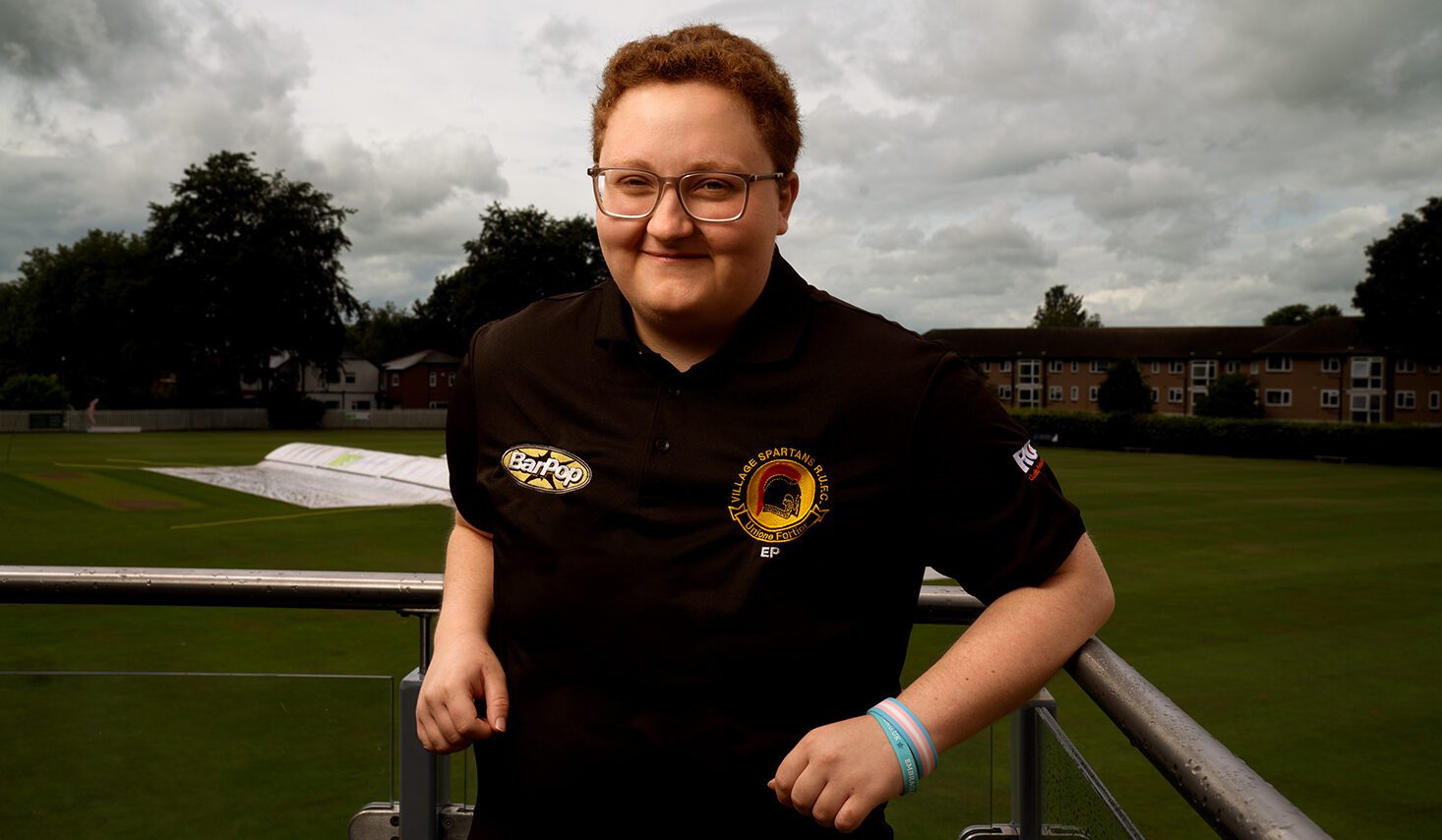
“Rugby saved me on a lot of occasions,” says Emmett Peacock. “I didn’t think I’d make it to 17, I didn’t think I’d make it to 18, and here I am feeling 100,000 times better within myself. I now have a future.”
As much as rugby is about the tackles, the scrums, and often, the mud, like any sport it’s nothing without the people playing it. But for decades historic barriers have left many in the LGBTQIA+ community at the touchlines unable to join in, whether in the form of discrimination, harmful stereotypes, or a lack of representation across the field.
Together with Channel 4 and VoltarolNaturals, GAY TIMES is encouraging communities who have felt excluded from rugby to feel empowered to take up their rightful spot in the game. To do this, we’ve created four films, each spotlighting a different perspective of someone in the community whose life has been enriched by the sport. Featuring English rugby legend and former Harlequins star Ugo Monye, the series sees Monye meet fans, coaches, and players like Peacock to demonstrate the heartwarming impact rugby has had on their lives.
A recent history graduate and player on queer rugby team the Manchester Spartans, for Peacock, rugby isn’t just a game. “Being able to join the rugby team at uni and then with the Manchester Spartans, I actually experienced LGBT+ culture,” he says, explaining that he’d never been to a queer club or night out before. “I know that I’m one of them… It’s made me be able to be more myself.”
But as is the reality for many transgender people, Peacock has struggled with navigating his identity in the past, and the beginning of university became a dark time in his life. “I stopped eating for a period of time, I lost a load of weight, and I self-harmed quite a lot,” he says.
In one instance before his exams, Peacock spent two days in hospital: “I thought I was protecting myself from the harsh reality of what being trans is,” he explains, referencing the horrifying murder of Brianna Ghey earlier this year.
However, our film captures Peacock at a brighter point in his transition, as he receives his top surgery. “This is my freedom,” he says, sitting around a fire on which he burns his last remaining chest binder with his loving mum, nan and brother before the operation. “Booking my top surgery, most of my problems went away,” he says. “The idea of putting a sports bra on or risking having my shirt pulled over my head during the game, I just couldn’t cope with it,” he continues. “I had to do something for me.”
Later on, Peacock would take Monye to Manchester’s iconic Canal Street for an important conversation about rugby’s relationship with the trans community.
In July 2022, the RFU (Rugby Football Union) banned trans women from participating in competitive games and implemented further restrictions on trans men’s participation in the sport. They based their decision on game-wide surveys, professional opinions and selected scientific reports.
Monye sits on the RFU’s DEI panel, and says that the topic was “the hardest one that we had to grapple with”. Peacock echoes how many in the trans community feel: they want transparency on the type of scientific evidence that was (and wasn’t) taken into account when making the decision.
“I don’t know how you can be diverse and inclusive and ban trans people?” he asks Monye. “It’s harsh knowing that I love the sport so much, but the people in charge don’t love me,” he says. “The whole world seems against us.”
For Monye, meeting Peacock has been an eye-opening and educational experience, from learning about how people weaponise deadnames to hearing about the other side of the rugby ban. “When you’re sat in front of a person who is ultimately affected, the legacy of those decisions is now confronting you in the face,” he reflects.
However, the ban has made trans players like Peacock more determined than ever. So much so that it partly inspired him to set up his own rugby club, the Transmanian Devils. “I’ve had such an amazing experience with the Spartans that I wanted to replicate that for other trans players,” he explains. “We want to get involved and we want to be heard.”
To celebrate Peacock, Monye gathers his family and teammates for a surprise party. It’s here Monye presents him with a unity ball – a lasting emblem of our campaign – with its own panel dedicated to Peacock and the Transmanian Devils.
Besides amplifying our message that we’re all stronger in rugby as one, the unity ball is a reflection of the dedicated work GAY TIMES, Channel 4 and VoltarolNaturals are doing to break down the stigma that prevents LGBTQIA+ people from getting involved in the sport. But we’re not alone in our mission, as making rugby more accessible for trans people is a top priority for Peacock, too. “Rugby is supposed to be a sport for all. It’s a sport for all shapes, sizes and bodies,” he says.
Peacock ends with a poignant message to his 11-year-old self: “It’s difficult, but just keep going. Pick yourself off, dust yourself down and keep going, because, eventually, it does get better.”
Watch the full Channel 4, VoltarolNaturals and GAY TIMES video below.